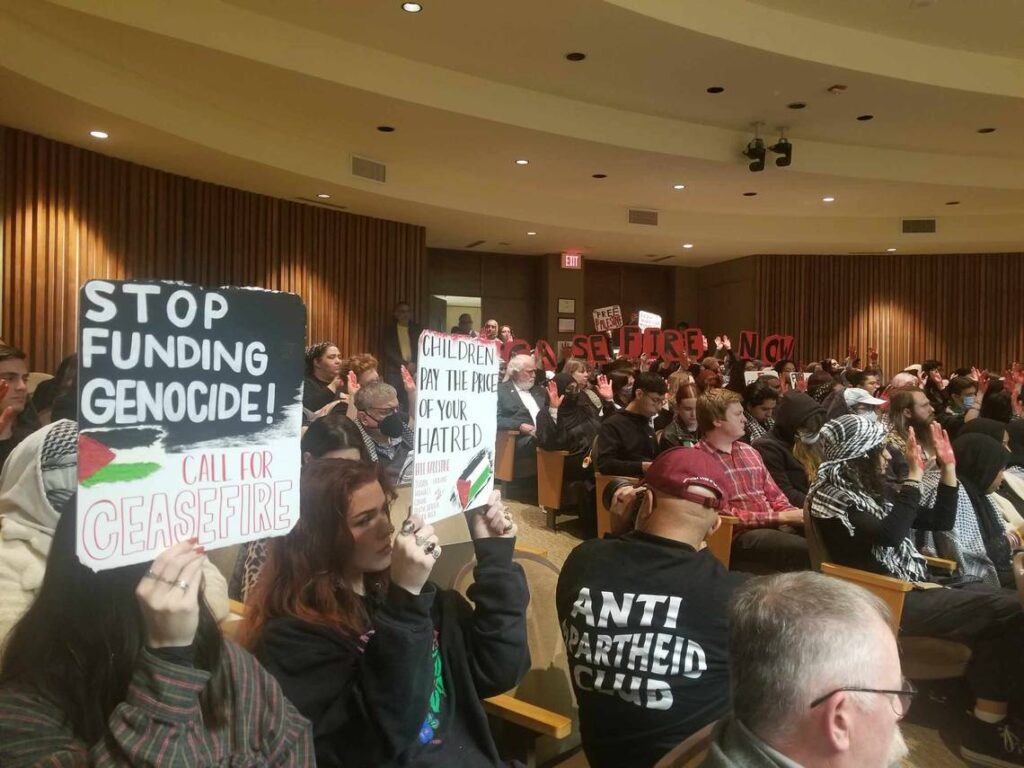Raleigh Mayor Janet Cowell issued a warning, actually several of them, last month.
“Again, I need to alert the audience that the speaker’s presentation includes images that are graphic in nature and viewers may find disturbing,” she said during a City Council meeting that was also streaming live and would be able to be viewed later.
The repeated warning came at the Jan. 14 council meeting as community members addressed city leaders.
In one instance, Asma Abu-Dahab, a social worker and therapist, approached the podium and said she was there to talk about how “our tax money is spent on the children of Gaza.”
A video began showing clips of children bloodied, injured or dead in Gaza from Israeli military strikes. Some lay in the dirt, others among stacks of bodies.
“The USA has been committing a genocide in Gaza for 466 days,” she said. “Raleigh is complicit with its tax money and silence.”
While the numbers have dwindled, community members and activists have continued to come speak about the Israel-Hamas War, even after council members split 4-4 on approving a local resolution urging a cease-fire last year.
Now, city leaders are banning future speakers from presenting images during their remarks. Council member Christina Jones was the sole vote against the prohibition on Tuesday.
Instead, digital images will be uploaded into the city’s online agenda, so people can look at them if they choose to.
Cowell said she heard concerns about the images being shown at council meetings when she was running for office.
“I’ve had a good friend who’s a therapist, and she said it’s horrendous to be broadcasting stuff that is so potentially violent and disturbing to unsuspecting people on a public broadcast,” she said.
Not all the shared photos and videos have been graphic. Speakers have brought videos of development flooding their property and parked cars blocking bike lanes.
The First Amendment prevents government officials from banning only certain types of images, requiring any restrictions to be “content neutral.”
But city meetings are streamed on television and online, including on YouTube, meaning Raleigh must comply with the rules of those platforms. That’s what’s prompted Cowell’s verbal warnings.
“I recognize that some images can be challenging to see, but at the same time we are here to listen,” Council member Jane Harrison said Tuesday. “I want to ensure that everybody who wants to come and talk to us about good, bad or ugly going on, has that opportunity.”
Other changes
City leaders also agreed to make clear on the city’s website and during meetings that they and city staff will receive but not respond to speakers or debate the issues they bring.
There are two meetings that have public comment opportunities. Public comment is the sole focus of a meeting held on the second Tuesday of the month at 7 p.m.
A motion to change the start time of the monthly meeting solely dedicated to public comments and to limit the maximum time for comments from three hours to two hours, failed in a 4-4 vote. Council members Stormie Forte, Megan Patton, Harrison and Jones voted against the proposal.
Harrison, Jones and Patton said they couldn’t support shortening the time, especially without getting input from community members first.
“I think it’s kind of insane that we’re changing it before we’ve heard directly from the public,” Jones said.
Forte, on the other hand, was in favor of shortening the time to an hour to align with what some other municipalities offer.
Read the full article here
